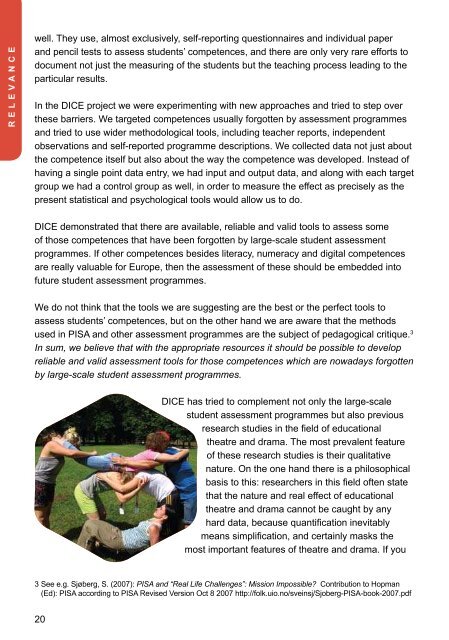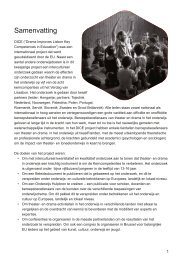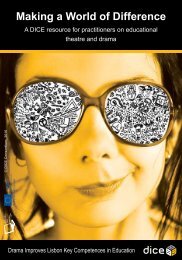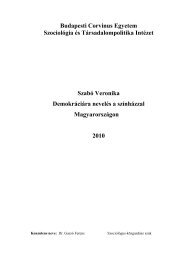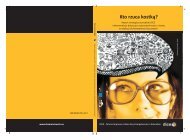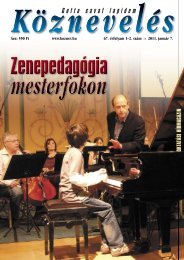Policy Paper - Drama Improves Lisbon Key Competences in Education
Policy Paper - Drama Improves Lisbon Key Competences in Education
Policy Paper - Drama Improves Lisbon Key Competences in Education
You also want an ePaper? Increase the reach of your titles
YUMPU automatically turns print PDFs into web optimized ePapers that Google loves.
Relevance<br />
well. They use, almost exclusively, self-report<strong>in</strong>g questionnaires and <strong>in</strong>dividual paper<br />
and pencil tests to assess students’ competences, and there are only very rare efforts to<br />
document not just the measur<strong>in</strong>g of the students but the teach<strong>in</strong>g process lead<strong>in</strong>g to the<br />
particular results.<br />
In the DICE project we were experiment<strong>in</strong>g with new approaches and tried to step over<br />
these barriers. We targeted competences usually forgotten by assessment programmes<br />
and tried to use wider methodological tools, <strong>in</strong>clud<strong>in</strong>g teacher reports, <strong>in</strong>dependent<br />
observations and self-reported programme descriptions. We collected data not just about<br />
the competence itself but also about the way the competence was developed. Instead of<br />
hav<strong>in</strong>g a s<strong>in</strong>gle po<strong>in</strong>t data entry, we had <strong>in</strong>put and output data, and along with each target<br />
group we had a control group as well, <strong>in</strong> order to measure the effect as precisely as the<br />
present statistical and psychological tools would allow us to do.<br />
DICE demonstrated that there are available, reliable and valid tools to assess some<br />
of those competences that have been forgotten by large-scale student assessment<br />
programmes. If other competences besides literacy, numeracy and digital competences<br />
are really valuable for Europe, then the assessment of these should be embedded <strong>in</strong>to<br />
future student assessment programmes.<br />
We do not th<strong>in</strong>k that the tools we are suggest<strong>in</strong>g are the best or the perfect tools to<br />
assess students’ competences, but on the other hand we are aware that the methods<br />
used <strong>in</strong> PISA and other assessment programmes are the subject of pedagogical critique. 3<br />
In sum, we believe that with the appropriate resources it should be possible to develop<br />
reliable and valid assessment tools for those competences which are nowadays forgotten<br />
by large-scale student assessment programmes.<br />
compare for example how broad is the def<strong>in</strong>ition of communication <strong>in</strong> the mother tongue<br />
(<strong>in</strong>clud<strong>in</strong>g read<strong>in</strong>g, writ<strong>in</strong>g, oral comprehension and expression) and how narrow is the<br />
methodology usually used to assess it (paper and pencil test) you can understand the<br />
basis of this criticism.<br />
On the other hand a qualitative approach cannot easily describe the effect of educational<br />
theatre and drama <strong>in</strong> a quantitative way, and this can lead to difficulty <strong>in</strong> communicat<strong>in</strong>g<br />
its value outside a narrow circle of specialists, keep<strong>in</strong>g it marg<strong>in</strong>alised and still largely<br />
undiscovered <strong>in</strong> ma<strong>in</strong>stream education. That is why DICE tried to collect the available<br />
evidence from both qualitative research studies and some exist<strong>in</strong>g quantitative trials, and<br />
on the basis of these we tried to develop a methodology which could serve as a bridge<br />
between the qualitative and quantitative approaches, and use the advantages of both.<br />
To our very best knowledge, DICE is the largest research study that has been conducted<br />
<strong>in</strong> the field of educational theatre and drama so far, with the largest population sample<br />
and the most complex design. In section D.4. we have <strong>in</strong>dicated some of the most wellknown<br />
previous research from the field, as a comparison with what we have found <strong>in</strong> our<br />
measurements. We hope we have been able to contribute to the measurement of some<br />
more complex skills and attitudes with a set of newly tested tools. We truly hope this<br />
research is just a beg<strong>in</strong>n<strong>in</strong>g and that on this basis many similar research studies will be<br />
launched – the field of educational theatre and drama really needs this.<br />
A.5. The relevance of the DICE project <strong>in</strong> current<br />
policy issues<br />
Relevance<br />
DICE has tried to complement not only the large-scale<br />
student assessment programmes but also previous<br />
research studies <strong>in</strong> the field of educational<br />
theatre and drama. The most prevalent feature<br />
of these research studies is their qualitative<br />
nature. On the one hand there is a philosophical<br />
basis to this: researchers <strong>in</strong> this field often state<br />
that the nature and real effect of educational<br />
theatre and drama cannot be caught by any<br />
hard data, because quantification <strong>in</strong>evitably<br />
means simplification, and certa<strong>in</strong>ly masks the<br />
most important features of theatre and drama. If you<br />
In this section we look at significant policy issues to which the DICE research relates.<br />
<strong>Education</strong>al theatre and drama – while be<strong>in</strong>g a dist<strong>in</strong>ct discipl<strong>in</strong>e and art-form <strong>in</strong><br />
its own right – can be very usefully and effectively l<strong>in</strong>ked to various broader policy<br />
areas: education, culture, youth, multil<strong>in</strong>gualism, social affairs, <strong>in</strong>clusion,<br />
entrepreneurship and <strong>in</strong>novation. The size of this book is not large enough to list all<br />
current relevant issues <strong>in</strong> these fields; all that we can do is to cover the most important<br />
issues and their potential l<strong>in</strong>ks to educational theatre and drama.<br />
Today’s long term European strategy is shaped by “Europe 2020: A strategy for smart,<br />
susta<strong>in</strong>able and <strong>in</strong>clusive growth”. The strategy outl<strong>in</strong>es several po<strong>in</strong>ts that have strong<br />
connections with educational theatre and drama. Among the five headl<strong>in</strong>e targets, the<br />
strategy mentions these two: 4<br />
3 See e.g. Sjøberg, S. (2007): PISA and “Real Life Challenges”: Mission Impossible? Contribution to Hopman<br />
(Ed): PISA accord<strong>in</strong>g to PISA Revised Version Oct 8 2007 http://folk.uio.no/sve<strong>in</strong>sj/Sjoberg-PISA-book-2007.pdf<br />
4 http://ec.europa.eu/eu2020/pdf/COMPLET%20EN%20BARROSO%20%20%20007%20-%20Europe%20<br />
2020%20-%20EN%20version.pdf downloaded on 18th July 2010. All “Europe 2020” quotations <strong>in</strong> this book<br />
are copied from this document.<br />
20<br />
21


